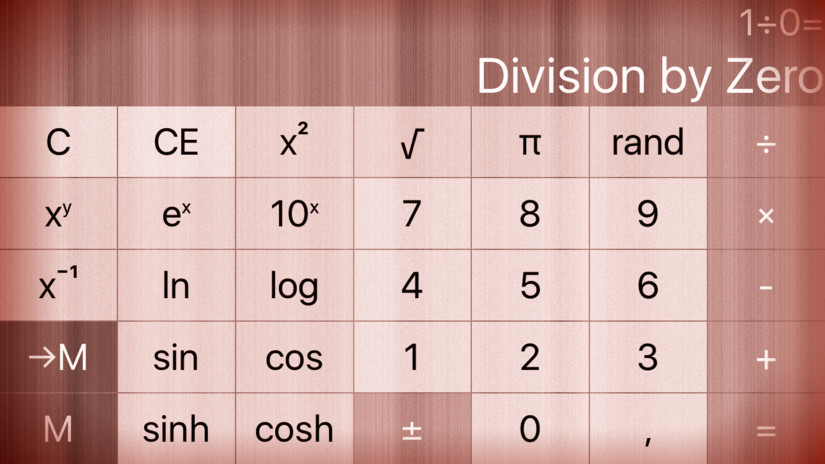Have your calculator report errors. For example, the square root of a negative number or divide by zero. There are a number of ways to go about “detecting” these errors (maybe add an associated value to the unary/binaryOperation cases which is a function that detects an error or perhaps have the function that is associated with a unary/binaryOperation return something that is either an error or a result or ???). How you report any discovered errors back to users of the CalculatorBrain API will require some API design on your part, but don’t force users of the CalculatorBrain API to deal with errors if they don’t want to (i.e. allow Controllers that want to display errors to do so, but let those that don’t just deal with NaN and +∞ appearing in their UI). In other words, don’t break any callers of the API described above (who don’t care about errors) to support this feature (i.e., add methods/ properties as needed instead). You are allowed to violate Required Task 11 to implement this Extra Credit item, but not Required Task 1 (you can enhance that data structure, but not switch to a new one).
Starting with the calculator brain, we could adjust the existing operations to include the error handling. Because most operations do not need error handling, create a new structure to hold the error functions:
private enum ErrorOperation {
case unaryOperation((Double) -> String?)
case binaryOperation((Double, Double) -> String?)
}
private let errorOperations: Dictionary<String,ErrorOperation> = [
"√": ErrorOperation.unaryOperation({ 0.0 > $0 ? "SQRT of negative Number" : nil }),
"÷": ErrorOperation.binaryOperation({ 1e-8 >= fabs($0.1) ? "Division by Zero" : nil }),
"x⁻¹" : ErrorOperation.unaryOperation({ 1e-8 > fabs($0) ? "Division by Zero" : nil }),
"ln" : ErrorOperation.unaryOperation({ 0 > $0 ? "LN of negative Number" : nil }),
"log" : ErrorOperation.unaryOperation({ 0 > $0 ? "LOG of negative Number" : nil }),
"x!" : ErrorOperation.unaryOperation({ 0 > $0 ? "Factorial of negative Number" : nil })
]
We will use those to set and return an error message string in the evaluate method:
func evaluate(using variables: Dictionary<String,Double>? = nil)
-> (result: Double?, isPending: Bool, description: String, error: String?)
{
var error: String?
...
return (result, nil != pendingBinaryOperation, description ?? "", error)
}
}
For operations with a single operand, we call the error message directly – if it exisits:
case .unaryOperation(let function, let description):
if nil != accumulator {
if let errorOperation = errorOperations[symbol],
case .unaryOperation(let errorFunction) = errorOperation {
error = errorFunction(accumulator!.0)
}
...
}
For binary operations we have to wait till we get the second operand – thus we handle errors when we perform the pending binary operation. … and need to store the symbol of the current operation:
struct PendingBinaryOperation {
let symbol: String
...
}
func performPendingBinaryOperation() {
if nil != pendingBinaryOperation && nil != accumulator {
if let errorOperation = errorOperations[pendingBinaryOperation!.symbol],
case .binaryOperation(let errorFunction) = errorOperation {
error = errorFunction(pendingBinaryOperation!.firstOperand.0, accumulator!.0)
}
...
}
}
… and provide the symbol during the evaluation:
case .binaryOperation(let function, let description):
...
pendingBinaryOperation = PendingBinaryOperation(symbol: symbol, function: function, description: description, firstOperand: accumulator!)
...
This way the view controller still works without changing anything.
We want to know the errors, therefore display them when they occur:
private func displayResult() {
...
if let error = evaluated.error {
display.text = error
} else if let result = evaluated.result {
displayValue = result
}
...
}
The complete code for the assignment #2 extra task #1 is available on GitHub.
